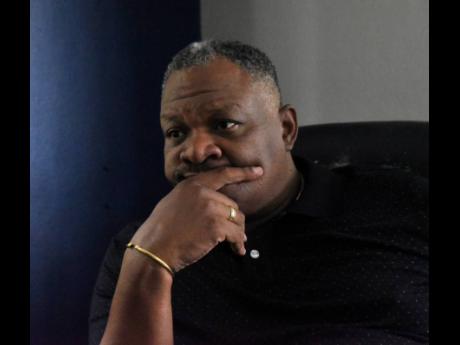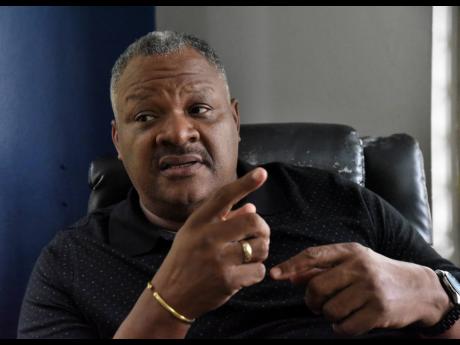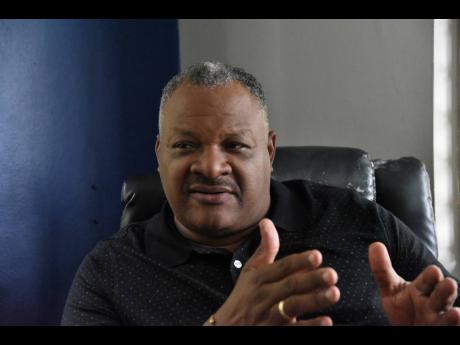How voting shame led to electoral overhaul
Danville Walker believes country’s voting system worthy of celebration in Ja60
His résumé could cause one to believe that Danville Walker has had nomadic tendencies since returning to Jamaica in May 1997 to head the Electoral Office of Jamaica (EOJ). But truth be told, he does not believe in hanging around once his expertise has been maximised and there are capable replacements.
Once the 1997 general election was completed, he was ready to move on. But then came a call from Dr Peter Phillips, then government minister with responsibility for electoral matters, asking him to stay on until the 2002 polls.
After mulling it over, Walker agreed to be part of the groundbreaking changes, seeing to the introduction of technology which the island’s two main political parties had given seals of approval through a then Electoral Advisory Committee (EAC).
Walker’s arrival at the EOJ set in motion an overhaul of the country’s electoral system, which was then believed to be vulnerable to widespread fraud.
The messy state of affairs resulted in tales of even the dead casting ballots and of political henchmen seizing ballot boxes and stuffing them with bogus votes, leading to some polling stations registering higher than 100 per cent turnout. Candidates would also reportedly show up and seize boxes if their goons informed them that their opponents seemed to be amassing more votes.
Anecdotes of electors being told to return home when they showed up at polling stations as a vote was already cast in their name were rife. So, too, was voter intimidation.
But some good men and women hunkered down and agreed that change was a must to safeguard the island’s democracy. They wanted a system that would guarantee one man, one vote.
The EAC introduced photographic identification of electors in the lead-up to the 1997 election, with electoral books now bearing images of voters to assist in verification. It would prove the catalyst for a well-needed change in direction, leading to the island’s system becoming the envy of the Caribbean and much of the Commonwealth. And worthy to be celebrated as part of Jamaica’s accomplishments in its 60 years of Independence.
Voter fraud was curtailed and where anything seemed suspicious, the EOJ boss could halt and rerun an entire general or local government election or rerun polls in a specific constituency or division.
In some areas, including previous high-fraud ones, a ballot was only issued to electors after their fingerprints were validated.
LANDMARK JUDGMENT
Walker would eventually stay on at the helm of the EOJ for not only the 2002 polls but also the 2007 general election. The latter polls proved to be historic, with the Jamaica Labour Party (JLP) regaining power after 18 years, with four of its candidates being embroiled in a dual-citizenship saga.
The Jamaican Constitution prohibits parliamentarians from holding dual citizenship, except in cases where the other country is a member of the Commonwealth.
The resulting court actions led to concerns that the then Bruce Golding-led administration could collapse, with just a two-seat majority in the Parliament. A landmark court overturn could see the People’s National Party (PNP) remaining in power and give Portia Simpson Miller her first electoral mandate, having succeeded P.J. Patterson as prime minister in 2006.
In a landmark judgment as the first case was tested, Chief Justice Zaila McCalla ruled that a by-election be held instead of the seat being handed to an opposing candidate.
Walker himself would also be exposed as having United States citizenship.
On reflection last week, Walker spoke of the frenzied activities to hold the 1997 election, but how pleased they all were that the results reflected the will of the people.
Walker said Jamaica had no choice but to fix what was a phenomenally corrupt system.
“There was a real fear that there could be an election and no one knows who the real winner is because of the level of fraud that system afforded. Also, people were afraid of becoming international pariahs and being scorned as having a flawed voting system. That’s why everybody agreed that a change was needed,” he told The Sunday Gleaner, suggesting that the country could reap dividends if the same attitude is taken towards crime and education.
“I was living in the United States for about 11 years and I came home and got the job as director of elections. I took the job May 26, 1997 and the first election that I did was December 18, 1997. So I had about six months to do three things, essentially: implement the new electoral registration system, which had been under way already but had run aground with no fingerprint cards in the country; production of a voters’ list; and hold an election within six months,” Walker explained.
The former Jamaica Defence Force (JDF) soldier had migrated to the United States, where he was trained as an accountant.
His expertise was to interrogate systems, procedures and numbers for a balance. But precision and discipline were also critical. His relationship with the JDF and the avoidance of the unsavoury created by politics would also be advantageous. When political henchmen and women began rebelling against the new system and threatened disruption, he simply called on the JDF.
And they answered.
THE POLITICS OF GARRISONS
When Walker returned to Jamaica, he had more knowledge of the American electoral system than his homeland’s. He did not even know in which constituency he resided.
“What amazed me was how corrupt it was. It was phenomenally corrupt. The number of electors on a voters’ list for one constituency in St Andrew South was 26,000 in 1993. After we introduced fingerprints to the voters’ list, and after five years of population growth, the voters’ list for the constituency was about 18,000. That’s the number of persons who disappeared from the list, because you couldn’t find them. I mean, they never existed in the first place,” he told The Sunday Gleaner.
Walker believes that political garrisons – where communities or entire constituencies would vote en bloc for one party – exist to guarantee an opposition.
“In countries like Grenada and Barbados, where all the seats are won by one party, that won’t happen in Jamaica because of garrisons,” he said. “It doesn’t matter what the popular vote is. Once you have garrisons in place, you are leader of the opposition; you will have a seat. We have had years where the leader of the party is not in Parliament, but that’s just till the next election. Both parties have it and both parties have conceded those areas,” he stated.
For him, political violence may have created garrisons, but it was not the fulcrum of their existence. They exist because one party has conceded that a particular seat is not winnable, so no resources are expended, thereby guaranteeing at least one seat for an opposition.
The 1997 election was not only a fiery baptism for Walker, but it was nothing short of an emergency surgery done hours before the polls opened on December 18.
“One of the toughest phone calls I received was from the late Dudley Thompson. I fundamentally believe that when you have a final voters’ list, it cannot be adjusted on election day. It was a feature of Jamaican elections and at 2 in the afternoon, an addendum to the list would come out, and those people would now turn up to vote. Of course, you would have looked to see how the voting was going before, and then the addendum,” he recalled.
“There were some fundamental rules that I was going to enforce and be assailed to, and one was that there would be no changes to the voters’ list. That call from Dudley Thompson – probably one of or the leading Pan-Africanist in Jamaica, historic figure by any imagination, and someone for whom I have had a lot of respect – told me that I left his name off the voters’ list,” explained Walker.
“I felt personally ashamed, but I told him, ‘Sir, I have come to a point where we have to hold the line and there are no more changes’,” he told The Sunday Gleaner.
“I remember him saying, ‘Walker!’ An old Royal Air Force (RAF) man, but he accepted it. If I could tell him that then, I could tell anybody. I later ran an internal election for the PNP and there were some shenanigans, in my view, but they signed off on the list. It turned out that some senior people were left off the voters’ list in how they prepared it. They left off Burchell Whiteman, the Speaker of the House, and I remember K.D. Knight upbraiding me, telling me it’s not my elections, it’s theirs. And I said, ‘No, Sir. Actually, it is my election’,” recalled Walker.
Validation after the 1997 polls came from none other than former United States President Jimmy Carter – then head of the Carter Center, an election watchdog agency in the North American country.
Carter told Walker the elections “was one of the cleanest [elections] he had ever seen”.
Part of the change included recruiting a new cadre of presiding officers, poll clerks and returning officers who were not politically recommended.
The work of individuals such as William Chin See, Professor Errol Miller, the late Senator Ryan Peralto and the members of the EAC also heralded the transformation into what is now a beacon of electoral pride.
Walker said he never second-guessed suggestions from independent members of the EAC, calling them persons of high national esteem, and he agreed that the EAC – now Electoral Commission of Jamaica – was, perhaps, the first oversight body which sought to fix the system.
Walker’s journey since leaving the EOJ saw him also making a foray into representational politics with quick disappointment. He also served as head of Jamaica Customs and was even a media boss.



